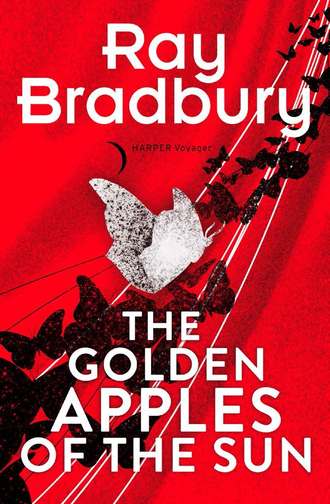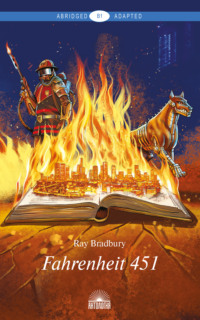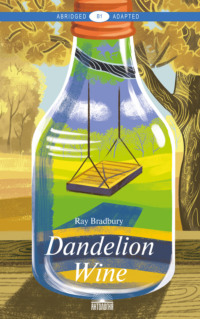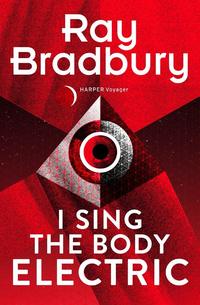
Полная версия
Golden Apples of the Sun
“I’m sure sorry, Mr. Ramirez,” she said.
“I don’t want to go back, Mrs. O’Brian,” he said weakly. “I like it here, I want to stay here. I’ve worked, I’ve got money. I look all right, don’t I? And I don’t want to go back!”
“I’m sorry, Mr. Ramirez,” she said. “I wish there was something I could do.”
“Mrs. O’Brian!” he cried suddenly, tears rolling out from under his eyelids. He reached out his hand and took her hand fervently, shaking it, wringing it, holding to it. “Mrs. O’Brian, I see you never, I see you never!”
The policemen smiled at this, but Mr. Ramirez did not notice it, and they stopped smiling very soon.
“Good-by, Mrs. O’Brian. You have been good to me. Oh, good-by, Mrs. O’Brian. I see you never!”
The policemen waited for Mr. Ramirez to turn, pick up his suitcase, and walk away. Then they followed him, tipping their caps to Mrs. O’Brian. She watched them go down the porch steps. Then she shut the door quietly and went slowly back to her chair at the table. She pulled the chair out and sat down. She picked up the shining knife and fork and started once more upon her steak.
“Hurry up, Mom,” said one of the sons. “It’ll be cold.”
Mrs. O’Brian took one bite and chewed on it for a long, slow time; then she stared at the closed door. She laid down her knife and fork.
“What’s wrong, Ma?” asked her son.
“I just realized,” said Mrs. O’Brian—she put her hand to her face—“I’ll never see Mr. Ramirez again.”
Embroidery
The dark porch air in the late afternoon was full of needle flashes, like a movement of gathered silver insects in the light. The three women’s mouths twitched over their work. Their bodies lay back and then imperceptibly forward, so that the rocking chairs tilted and murmured. Each woman looked to her own hands, as if quite suddenly she had found her heart beating there.
“What time is it?”
“Ten minutes to five.”
“Got to get up in a minute and shell those peas for dinner.”
“But—” said one of them.
“Oh yes, I forgot. How foolish of me.... ” the first woman paused, put down her embroidery and needle, and looked through the open porch door, through the warm interior of the quiet house, to the silent kitchen. There upon the table, seeming more like symbols of domesticity than anything she had ever seen in her life, lay the mound of fresh-washed peas in their neat, resilient jackets, waiting for her fingers to bring them into the world.
“Go hull them if it’ll make you feel good,” said the second woman.
“No,” said the first. “I won’t. I just won’t.”
The third woman sighed. She embroidered a rose, a leaf, a daisy on a green field. The embroidery needle rose and vanished.
The second woman was working on the finest, most delicate piece of embroidery of them all, deftly poking, finding, and returning the quick needle upon innumerable journeys. Her quick black glance was on each motion. A flower, a man, a road, a sun, a house; the scene grew under hand, a miniature beauty, perfect in every threaded detail.
“It seems at times like this that it’s always your hands you turn to,” she said, and the others nodded enough to make the rockers rock again.
“I believe,” said the first lady, “that our souls are in our hands. For we do everything to the world with our hands. Sometimes I think we don’t use our hands half enough; it’s certain we don’t use our heads.”
They all peered more intently at what their hands were doing. “Yes,” said the third lady, “when you look back on a whole lifetime, it seems you don’t remember faces so much as hands and what they did.”
They recounted to themselves the lids they had lifted, the doors they had opened and shut, the flowers they had picked, the dinners they had made, all with slow or quick fingers, as was their manner or custom. Looking back, you saw a flurry of hands, like a magician’s dream, doors popping wide, taps turned, brooms wielded, children spanked. The flutter of pink hands was the only sound; the rest was a dream without voices.
“No supper to fix tonight or tomorrow night or the next night after that,” said the third lady.
“No windows to open or shut.”
“No coal to shovel in the basement furnace next winter.”
“No papers to clip cooking articles out of.”
And suddenly they were crying. The tears rolled softly down their faces and fell into the material upon which their fingers twitched.
“This won’t help things,” said the first lady at last, putting the back of her thumb to each under-eyelid. She looked at her thumb and it was wet.
“Now look what I’ve done!” cried the second lady, exasperated. The others stopped and peered over. The second lady held out her embroidery. There was the scene, perfect except that while the embroidered yellow sun shone down upon the embroidered green field, and the embroidered brown road curved toward an embroidered pink house, the man standing on the road had something wrong with his face.
“I’ll just have to rip out the whole pattern, practically, to fix it right,” said the second lady.
“What a shame.” They all stared intently at the beautiful scene with the flaw in it.
The second lady began to pick away at the thread with her little deft scissors flashing. The pattern came out thread by thread. She pulled and yanked, almost viciously. The man’s face was gone. She continued to seize at the threads.
“What are you doing?” asked the other women.
They leaned and saw what she had done.
The man was gone from the road. She had taken him out entirely.
They said nothing but returned to their own tasks.
“What time is it?” asked someone.
“Five minutes to five.”
“Is it supposed to happen at five o’clock?”
“Yes.”
“And they’re not sure what it’ll do to anything, really, when it happens?”
“No, not sure.”
“Why didn’t we stop them before it got this far and this big?”
“It’s twice as big as ever before. No, ten times, maybe a thousand.”
“This isn’t like the first one or the dozen later ones. This is different. Nobody knows what it might do when it comes.”
They waited on the porch in the smell of roses and cut grass. “What time is it now?”
“One minute to five.”
The needles flashed silver fire. They swam like a tiny school of metal fish in the darkening summer air.
Far away a mosquito sound. Then something like a tremor of drums. The three women cocked their heads, listening.
“We won’t hear anything, will we?”
“They say not.”
“Perhaps we’re foolish. Perhaps we’ll go right on, after five o’clock, shelling peas, opening doors, stirring soups, washing dishes, making lunches, peeling oranges.... ”
“My, how we’ll laugh to think we were frightened by an old experiment!” They smiled a moment at each other.
“It’s five o’clock.”
At these words, hushed, they all busied themselves. Their fingers darted. Their faces were turned down to the motions they made. They made frantic patterns. They made lilacs and grass and trees and houses and rivers in the embroidered cloth. They said nothing, but you could hear their breath in the silent porch air.
Thirty seconds passed.
The second woman sighed finally and began to relax.
“I think I just will go shell those peas for supper,” she said. “I—”
But she hadn’t time even to lift her head. Somewhere, at the side of her vision, she saw the world brighten and catch fire. She kept her head down, for she knew what it was. She didn’t look up, nor did the others, and in the last instant their fingers were flying; they didn’t glance about to see what was happening to the country, the town, this house, or even this porch. They were only staring down at the design in their flickering hands.
The second woman watched an embroidered flower go. She tried to embroider it back in, but it went, and then the road vanished, and the blades of grass. She watched a fire, in slow motion almost, catch upon the embroidered house and unshingle it, and pull each threaded leaf from the small green tree in the hoop, and she saw the sun itself pulled apart in the design. Then the fire caught upon the moving point of the needle while still it flashed; she watched the fire come along her fingers and arms and body, untwisting the yarn of her being so painstakingly that she could see it in all its devilish beauty, yanking out the pattern from the material at hand. What it was doing to the other women or the furniture or the elm tree in the yard, she never knew. For now, yes, now! it was plucking at the white embroidery of her flesh, the pink thread of her cheeks, and at last it found her heart, a soft red rose sewn with fire, and it burned the fresh, embroidered petals away, one by delicate one....
The Big Black and White Game
The people filled the stands behind the wire screen, waiting. Us kids, dripping from the lake, ran between the white cottages, past the resort hotel, screaming, and sat on the bleachers, making wet bottom marks. The hot sun beat down through the tall oak trees around the baseball diamond. Our fathers and mothers, in golf pants and light summer dresses, scolded us and made us sit still.
We looked toward the hotel and the back door of the vast kitchen, expectantly. A few colored women began walking across the shade-freckled area between, and in ten minutes the far left section of the bleachers was mellow with the color of their fresh-washed faces and arms. After all these years, whenever I think back on it, I can still hear the sounds they made. The sound on the warm air was like a soft moving of dove voices each time they talked among themselves.
Everybody quickened into amusement, laughter rose right up into the clear blue Wisconsin sky, as the kitchen door flung wide and out ran the big and little, the dark and high-yellar uniformed Negro waiters, janitors, bus boys, boatmen, cooks, bottle washers, soda jerks, gardeners, and golf-links tenders. They came capering, showing their fine white teeth, proud of their new red-striped uniforms, their shiny shoes rising and coming down on the green grass as they skirted the bleachers and drifted with lazy speed out on the field, calling to everybody and everything.
Us kids squealed. There was Long Johnson, the lawn-cutting man, and Cavanaugh, the soda-fountain man, and Shorty Smith and Pete Brown and Jiff Miller!
And there was Big Poe! Us kids shouted, applauded!
Big Poe was the one who stood so tall by the popcorn machine every night in the million-dollar dance pavilion farther down beyond the hotel on the lake rim. Every night I bought popcorn from Big Poe and he poured lots of butter all over it for me.
I stomped and yelled, “Big Poe! Big Poe!”
And he looked over at me and stretched his lips to bring out his teeth, waved, and shouted a laugh.
And Mama looked to the right, to the left, and back of us with worried eyes and nudged my elbow. “Hush,” she said. “Hush.”
“Land, land,” said the lady next to my mother, fanning herself with a folded paper. “This is quite a day for the colored servants, ain’t it? Only time of year they break loose. They look forward all summer to the big Black and White game. But this ain’t nothing. You seen their Cakewalk Jamboree?”
“We got tickets for it,” said Mother. “For tonight at the pavilion. Cost us a dollar each. That’s pretty expensive, I’d say.”
“But I always figure,” said the woman, “once a year you got to spend. And it’s really something to watch them dance. They just naturally got …”
“Rhythm,” said Mother.
“That’s the word,” said the lady. “Rhythm. That’s what they got. Land, you should see the colored maids up at the hotel. They been buying satin yardage in at the big store in Madison for a month now. And every spare minute they sit sewing and laughing. And I seen some of the feathers they bought for their hats. Mustard and wine ones and blue ones and violet ones. Oh, it’ll be a sight!”
“They been airing out their tuxedos,” I said. “I saw them hanging on lines behind the hotel all last week!”
“Look at them prance,” said Mother. “You’d think they thought they were going to win the game from our men.”
The colored men ran back and forth and yelled with their high, fluting voices and their low, lazy, interminable voices. Way out in center field you could see the flash of teeth, their upraised naked black arms swinging and beating their sides as they hopped up and down and ran like rabbits, exuberantly.
Big Poe took a double fistful of bats, bundled them on his huge bull shoulder, and strutted along the first-base line, head back, mouth smiling wide open, his tongue moving, singing:
“—gonna dance out both of my shoes,
When they play those Jelly Roll Blues;
Tomorrow night at the Dark Town Strutters’ Ball!”
Up went his knees and down and out, swinging the bats like musical batons. A burst of applause and soft laughter came from the left-hand grandstands, where all the young, ripply colored girls with shiny brown eyes sat eager and easy. They made quick motions that were graceful and mellow because, maybe, of their rich coloring. Their laughter was like shy birds; they waved at Big Poe, and one of them with a high voice cried,, “Oh, Big Poe! Oh, Big Poe!”
The white section joined politely in the applause as Big Poe finished his cakewalk. “Hey, Poe!” I yelled again.
“Stop that, Douglas!” said Mother, straight at me.
Now the white men came running between the trees with their uniforms on. There was a great thunder and shouting and rising up in our grandstand. The white men ran across the green diamond, flashing white.
“Oh, there’s Uncle George!” said Mother. “My, doesn’t he look nice?” And there was my Uncle George toddling along in his outfit which didn’t quite fit because Uncle has a potbelly, and jowls that sit out over any collar he puts on. He was hurrying along, trying to breathe and smile at the same time, lifting up his pudgy little legs. “My, they look so nice,” enthused Mother.
I sat there, watching their movements. Mother sat beside me, and I think she was comparing and thinking, too, and what she saw amazed and disconcerted her. How easily the dark people had come running first, like those slow-motion deer and buck antelopes in those African moving pictures, like things in dreams. They came like beautiful brown, shiny animals that didn’t know they were alive, but lived. And when they ran and put their easy, lazy, timeless legs out and followed them with their big, sprawling arms and loose fingers and smiled in the blowing wind, their expressions didn’t say, “Look at me run, look at me run!” No, not at all. Their faces dreamily said,, “Lord, but it’s sure nice to run. See the ground swell soft under me? Gosh, I feel good. My muscles are moving like oil on my bones and it’s the best pleasure in the world to run.” And they ran. There was no purpose to their running but exhilaration and living.
The white men worked at their running as they worked at everything. You felt embarrassed for them because they were alive too much in the wrong way. Always looking from the corners of their eyes to see if you were watching. The Negroes didn’t care if you watched or not; they went on living, moving. They were so sure of playing that they didn’t have to think about it anymore.
“My, but our men look so nice,” said my mother, repeating herself rather flatly. She had seen, compared the teams. Inside, she realized how laxly the colored men hung swaying in their uniforms, and how tensely, nervously, the white men were crammed, shoved, and belted into their outfits.
I guess the tenseness began then.
I guess everybody saw what was happening. They saw how the white men looked like senators in sun suits. And they admired the graceful unawareness of the colored men. And, as is always the case, that admiration turned to envy, to jealousy, to irritation. It turned to conversation like:
“That’s my husband, Tom, on third base. Why doesn’t he pick up his feet? He just stands there.”
“Never you mind, never you mind. He’ll pick ’em up when the time comes!”
“That’s what I say! Now, take my Henry, for instance. Henry mightn’t be active all the time, but when there’s a crisis—just you watch him. Uh—I do wish he’d wave or something, though. Oh, there! Hello, Henry!”
“Look at that Jimmie Cosner playing around out there!”
I looked. A medium-sized white man with a freckled face and red hair was clowning on the diamond. He was balancing a bat on his forehead. There was laughter from the white grandstand. But it sounded like the kind of laughter you laugh when you’re embarrassed for someone.
“Play ball!” said the umpire.
A coin was flipped. The colored men batted first.
“Darn it,” said my mother.
The colored men ran in from the field happily.
Big Poe was first to bat. I cheered. He picked up the bat in one hand like a toothpick and idled over to the plate and laid the bat on his thick shoulder, smiling along its polished surface toward the stands where the colored women sat with their fresh flowery cream dresses stirring over their legs, which hung down between the seat intervals like crisp new sticks of ginger; their hair was all fancily spun and hung over their ears. Big Poe looked in particular at the little, dainty-as-a-chicken-bone shape of his girl friend Katherine. She was the one who made the beds at the hotel and cottages every morning, who tapped on your door like a bird and politely asked if you was done dreaming, ‘cause if you was she’d clean away all them old nightmares and bring in a fresh batch—please use them one at a time, thank yoah. Big Poe shook his head, looking at her, as if he couldn’t believe she was there. Then he turned, one hand balancing the bat, his left hand dangling free at his side, to await the trial pitches. They hissed past, spatted into the open mouth of the catcher’s mitt, were hurled back. The umpire grunted. The next pitch was the starter.
Big Poe let the first ball go by him.
“Stee-rike!” announced the umpire. Big Poe winked good-naturedly at the white folks. Bang! “Stee-rike two!” cried the umpire.
The ball came for the third time.
Big Poe was suddenly a greased machine pivoting; the dangling hand swept up to the butt end of the bat, the bat swiveled, connected with the ball———Whack! The ball shot up into the sky, away down toward the wavering line of oak trees, down toward the lake, where a white sailboat slid silently by. The crowd yelled, me loudest! There went Uncle George, running on his stubby, wool-stockinged legs, getting smaller with distance.
Big Poe stood for a moment watching the ball go. Then he began to run. He went around the bases, loping, and on the way home from third base he waved to the colored girls naturally and happily and they waved back, standing on their seats and shrilling.
Ten minutes later, with the bases loaded and run after run being driven in, and Big Poe coming to bat again, my mother turned to me. “They’re the most inconsiderate people,” she said.
“But that’s the game,” I said. “They’ve only got two outs.”
“But the score’s seven to nothing,” my mother protested.
“Well, just you wait until our men come to bat,” said the lady next to my mother, waving away a fly with a pale blue-veined hand. “Those Negroes are too big for their britches.”
“Stee-rike two!” said the umpire as Big Poe swung.
Конец ознакомительного фрагмента.
Текст предоставлен ООО «ЛитРес».
Прочитайте эту книгу целиком, купив полную легальную версию на ЛитРес.
Безопасно оплатить книгу можно банковской картой Visa, MasterCard, Maestro, со счета мобильного телефона, с платежного терминала, в салоне МТС или Связной, через PayPal, WebMoney, Яндекс.Деньги, QIWI Кошелек, бонусными картами или другим удобным Вам способом.









